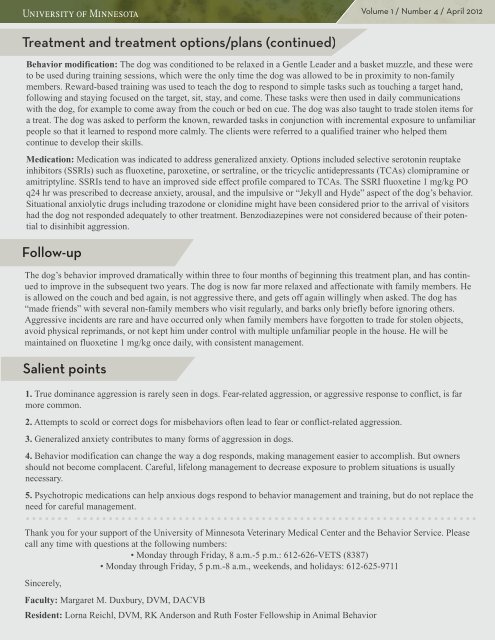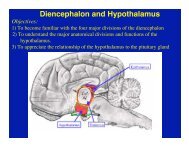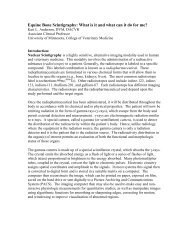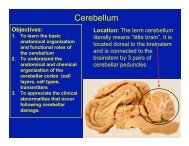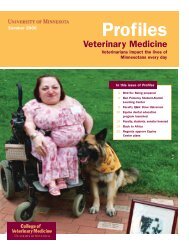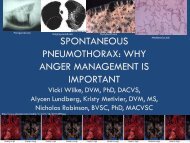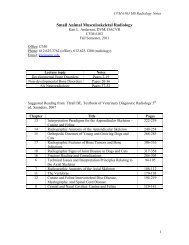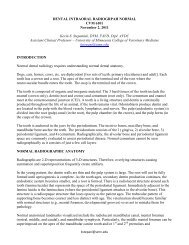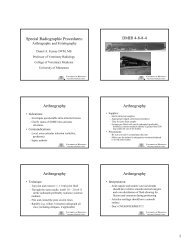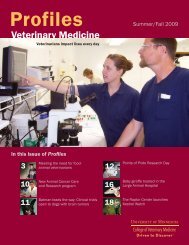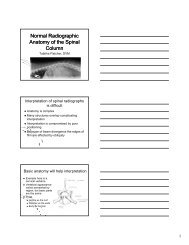Number 4/April 2012 Behavior Service - University of Minnesota ...
Number 4/April 2012 Behavior Service - University of Minnesota ...
Number 4/April 2012 Behavior Service - University of Minnesota ...
Create successful ePaper yourself
Turn your PDF publications into a flip-book with our unique Google optimized e-Paper software.
Volume 1 / <strong>Number</strong> 4 / <strong>April</strong> <strong>2012</strong>Treatment and treatment options/plans (continued)<strong>Behavior</strong> modification: The dog was conditioned to be relaxed in a Gentle Leader and a basket muzzle, and these wereto be used during training sessions, which were the only time the dog was allowed to be in proximity to non-familymembers. Reward-based training was used to teach the dog to respond to simple tasks such as touching a target hand,following and staying focused on the target, sit, stay, and come. These tasks were then used in daily communicationswith the dog, for example to come away from the couch or bed on cue. The dog was also taught to trade stolen items fora treat. The dog was asked to perform the known, rewarded tasks in conjunction with incremental exposure to unfamiliarpeople so that it learned to respond more calmly. The clients were referred to a qualified trainer who helped themcontinue to develop their skills.Medication: Medication was indicated to address generalized anxiety. Options included selective serotonin reuptakeinhibitors (SSRIs) such as fluoxetine, paroxetine, or sertraline, or the tricyclic antidepressants (TCAs) clomipramine oramitriptyline. SSRIs tend to have an improved side effect pr<strong>of</strong>ile compared to TCAs. The SSRI fluoxetine 1 mg/kg POq24 hr was prescribed to decrease anxiety, arousal, and the impulsive or “Jekyll and Hyde” aspect <strong>of</strong> the dog’s behavior.Situational anxiolytic drugs including trazodone or clonidine might have been considered prior to the arrival <strong>of</strong> visitorshad the dog not responded adequately to other treatment. Benzodiazepines were not considered because <strong>of</strong> their potentialto disinhibit aggression.Follow-upThe dog’s behavior improved dramatically within three to four months <strong>of</strong> beginning this treatment plan, and has continuedto improve in the subsequent two years. The dog is now far more relaxed and affectionate with family members. Heis allowed on the couch and bed again, is not aggressive there, and gets <strong>of</strong>f again willingly when asked. The dog has“made friends” with several non-family members who visit regularly, and barks only briefly before ignoring others.Aggressive incidents are rare and have occurred only when family members have forgotten to trade for stolen objects,avoid physical reprimands, or not kept him under control with multiple unfamiliar people in the house. He will bemaintained on fluoxetine 1 mg/kg once daily, with consistent management.Salient points1. True dominance aggression is rarely seen in dogs. Fear-related aggression, or aggressive response to conflict, is farmore common.2. Attempts to scold or correct dogs for misbehaviors <strong>of</strong>ten lead to fear or conflict-related aggression.3. Generalized anxiety contributes to many forms <strong>of</strong> aggression in dogs.4. <strong>Behavior</strong> modification can change the way a dog responds, making management easier to accomplish. But ownersshould not become complacent. Careful, lifelong management to decrease exposure to problem situations is usuallynecessary.5. Psychotropic medications can help anxious dogs respond to behavior management and training, but do not replace theneed for careful management.Thank you for your support <strong>of</strong> the <strong>University</strong> <strong>of</strong> <strong>Minnesota</strong> Veterinary Medical Center and the <strong>Behavior</strong> <strong>Service</strong>. Pleasecall any time with questions at the following numbers:• Monday through Friday, 8 a.m.-5 p.m.: 612-626-VETS (8387)• Monday through Friday, 5 p.m.-8 a.m., weekends, and holidays: 612-625-9711Sincerely,Faculty: Margaret M. Duxbury, DVM, DACVBResident: Lorna Reichl, DVM, RK Anderson and Ruth Foster Fellowship in Animal <strong>Behavior</strong>


